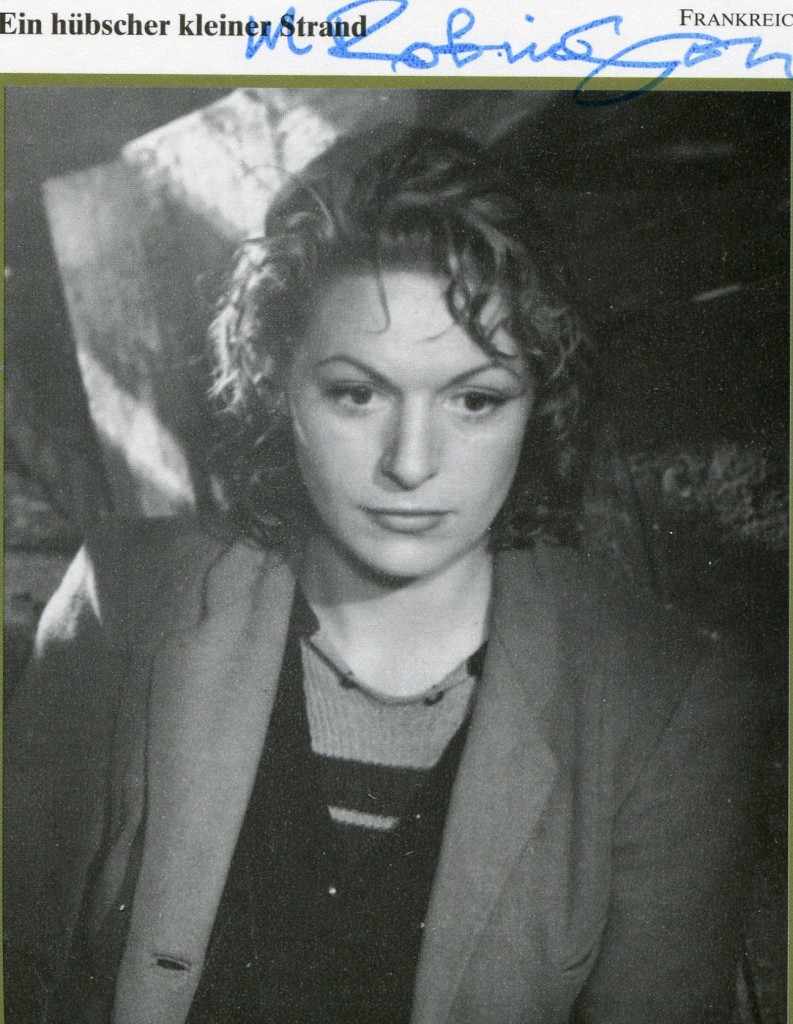
Madeleine Robinson was born in 1916 in Paris. She made her movie debut in 1935 in “Promesses”. Her other films include “The Royalists” in 1947, “Tuesday’s Guest” and “Alone in the World”. She died in 2004 in Lausanne Switzerland.
Ronald Bergan’s “Guardian” obituary:
Despite her Anglo-Saxon-sounding name, the actor Madeleine Robinson, who has died aged 87, typified the sophistication and allure of French stars, particularly during the 1940s and 1950s. In fact, she was born Madeleine Svoboda in Paris of a Czech father, a pastry chef, and French mother who was a bus conductor. She chose the name of Daniel Defoe’s castaway because “it was a synonym of liberty”. Throughout her life, she had a series of poodles that she called Vendredi (Friday). Determinedly independent, Robinson was known not only for the intensity of her performances but for her fiery temperament off stage and screen. Her confrontations with directors, and squabbles with her lovers and husbands (one of her three being the Spanish writer and actor José-Luis de Villalonga) fed the gossip columns.
She started work in a factory at the age of 14, and then worked as a messenger girl and as a maid in the house of an artist, who encouraged her to enrol for a drama course given by the celebrated director Charles Dullin in the school attached to his Thétre de l’Atelier. In 1934, aged 18, she appeared in Soldiers Without Uniform, the first of her 79 films, and it was not long before she gained substantial roles in films by the leading French directors of the day, both before the war and during the German occupation. One of the best was Jean Grémillon’s Lumiere d’Été (1943), banned by the Vichy authorities for its allegorical attack on the decadence and corruption of the ruling classes. Written by Jacques Prévert, it was set in an isolated mountain hotel where Robinson is the focal point as a naive young woman who has come to meet her dissolute fiance (Pierre Brasseur), a drunken artist. Disappointed in the soullessness of this society and disillusioned by her fiance, she is drawn to a young engineer whose values eventually inspire her to love.
In Douce (1943), directed by Claude Autant-Lara, she is far from innocent as the ambitious tutor to a young daughter of an aristocratic family with designs on marrying the head of the household. The following year, she was a young woman trapped in a dreary village, in Sortilèges (1945) by Christian-Jaque, with another poetic Prévert screenplay. Doom and gloom continued in Yves Allegret’s Une Si Jolie Petite Plage (Riptide, 1945), an archetypal fatalistic postwar French drama, which cast Robinson opposite Gérard Philipe in the role of a fugitive at a desolate seaside resort in rainy Normandy in winter.As a dishevelled chambermaid, she vainly tries to rescue him from despair.Not much joy either in Dieu A Besoin Des Hommes (1950) by Jean Delannoy, where Robinson, living on a rugged and barren island off the Brittany coast, is the fiancee rejected by Pierre Fresnay, when he decides that his calling is to become a priest.
For much of the 1950s, Robinson made films for, in her words, raisons alimentaires, but later benefited from better roles as a mature woman. Claude Chabrol astutely cast her as a neurotic wife of an adulterous wine merchant in A Double Tour (Web Of Passion, 1959), which gained her the best actress award at the Venice Film Festival. She was also effective as Joseph K’s landlady, Frau Grubach, in Orson Welles’s The Trial (1962). Meanwhile, Robinson was enjoying a parallel stage career, especially powerful in Jean Cocteau’s adaptation of Tennessee Williams’ A Streetcar Named Desire; as the domineering mother in Cocteau’s Les Parents Terribles, the foul-mouthed Martha in Who’s Afraid of Virginia Woolf?, and playing Brecht’s Mother Courage. One of her last notable screen roles was as the narrow-minded mother of Isabelle Adjani, who took the title role in Camille Claudel (1988).
In 1993, Robinson retired to her house in Switzerland, garlanded with many awards including the Legion of Honour, the National Order of Merit, and Commander of Arts and Letters.· She is survived by a son; her daughter predeceased her.
The above “Guardian” obituary can also be accessed online here.


